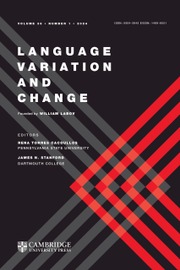Crossref Citations
This article has been cited by the following publications. This list is generated based on data provided by
Crossref.
Hawkins, John A.
2003.
Determinants of Grammatical Variation in English.
p.
175.
Thibeau, Tully
2005.
Review of Rohdenburg & Mondorf (2003): Determinants of Grammatical Variation in English.
Studies in Language,
Vol. 29,
Issue. 3,
p.
683.
Bannard, Colin
2005.
Learning about the meaning of verb–particle constructions from corpora.
Computer Speech & Language,
Vol. 19,
Issue. 4,
p.
467.
Hawkins, John A.
2007.
Processing typology and why psychologists need to know about it.
New Ideas in Psychology,
Vol. 25,
Issue. 2,
p.
87.
SHIOBARA, KAYONO
2007.
Why Are Grammars the Way They Are: A Functional Formalist View (J. A. Hawkins, Efficiency and Complexity in Grammars).
ENGLISH LINGUISTICS,
Vol. 24,
Issue. 2,
p.
599.
Zareva, Alla
2009.
Informational packaging, level of formality, and the use of circumstance adverbials in L1 and L2 student academic presentations.
Journal of English for Academic Purposes,
Vol. 8,
Issue. 1,
p.
55.
Jaeger, T. Florian
and
Norcliffe, Elisabeth J.
2009.
The Cross‐linguistic Study of Sentence Production.
Language and Linguistics Compass,
Vol. 3,
Issue. 4,
p.
866.
Tily, Harry
and
Jaeger, T. Florian
2011.
Complementing quantitative typology with behavioral approaches: Evidence for typological universals.
Linguistic Typology,
Vol. 15,
Issue. 2,
Jaeger, T. Florian
and
Tily, Harry
2011.
On language ‘utility’: processing complexity and communicative efficiency.
WIREs Cognitive Science,
Vol. 2,
Issue. 3,
p.
323.
Fox, Gwendoline
and
Thuilier, Juliette
2012.
New Directions in Logic, Language and Computation.
Vol. 7415,
Issue. ,
p.
1.
WIECHMANN, DANIEL
and
KERZ, ELMA
2013.
The positioning of concessive adverbial clauses in English: assessing the importance of discourse-pragmatic and processing-based constraints.
English Language and Linguistics,
Vol. 17,
Issue. 1,
p.
1.
2013.
Linguistic Fundamentals for Natural Language Processing.
Nykiel, Joanna
2013.
Clefts and preposition omission under sluicing.
Lingua,
Vol. 123,
Issue. ,
p.
74.
Kizach, Johannes
and
Balling, Laura Winther
2013.
Givenness, complexity, and the Danish dative alternation.
Memory & Cognition,
Vol. 41,
Issue. 8,
p.
1159.
Wiechmann, Daniel
and
Lohmann, Arne
2013.
Domain minimization and beyond: Modeling prepositional phrase ordering.
Language Variation and Change,
Vol. 25,
Issue. 1,
p.
65.
Chrambach, Susanne
2014.
Contact, Variation, and Change in the History of English.
Vol. 159,
Issue. ,
p.
39.
Hernández, Roberto Mayoral
and
Alcázar, Asier
2014.
Variation within and across Romance Languages.
Vol. 333,
Issue. ,
p.
119.
Rys, Jonah
and
De Cuypere, Ludovic
2014.
Variable satellite placement in spoken Dutch.
International Journal of Corpus Linguistics,
Vol. 19,
Issue. 4,
p.
548.
Kizach, Johannes
2015.
Animacy and the ordering of postverbal prepositional phrases in Danish.
Acta Linguistica Hafniensia,
Vol. 47,
Issue. 2,
p.
199.
Lawyer, Lewis C.
2015.
The oblique phrase and the order of the relative construction.
STUF - Language Typology and Universals,
Vol. 68,
Issue. 4,
p.
515.


